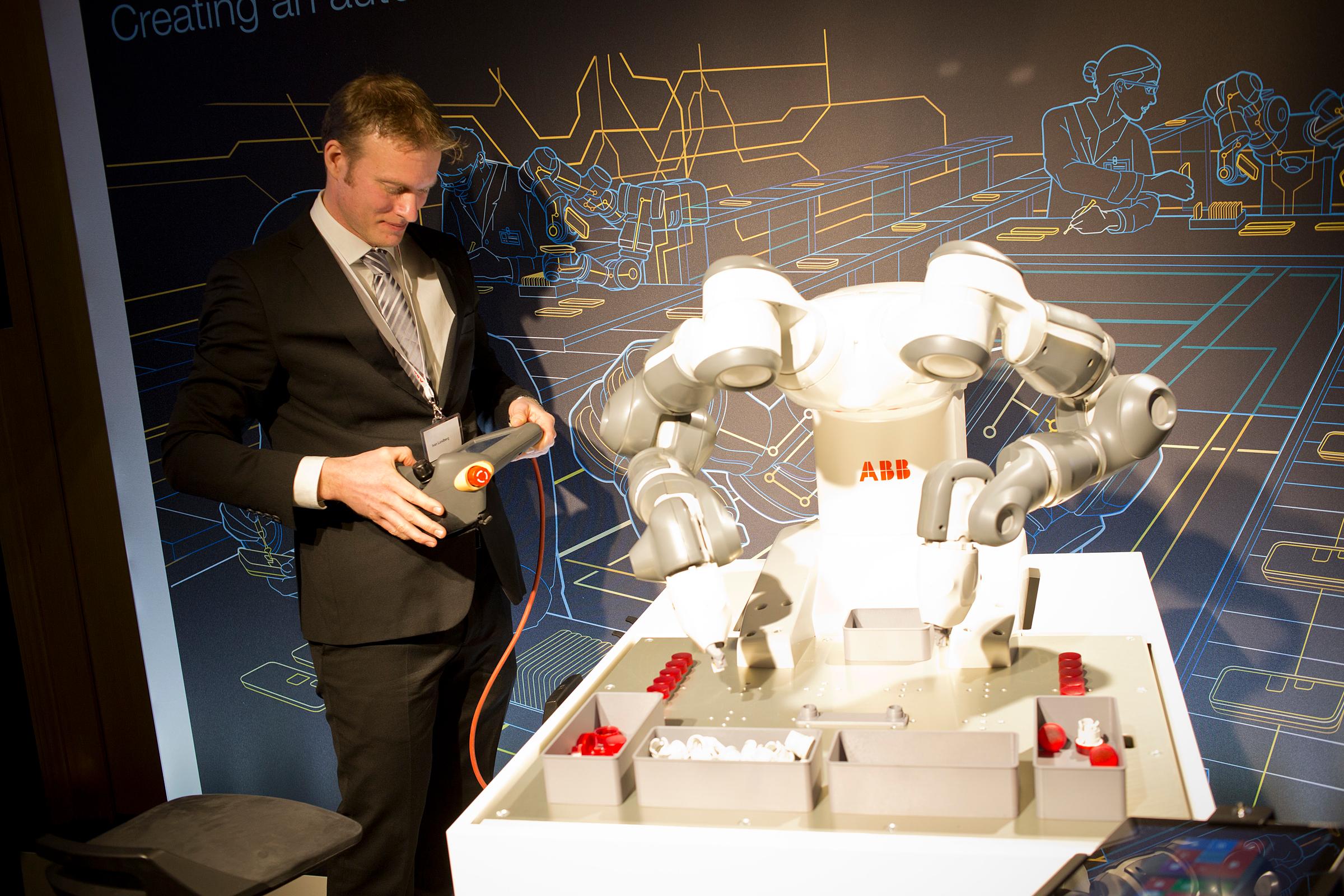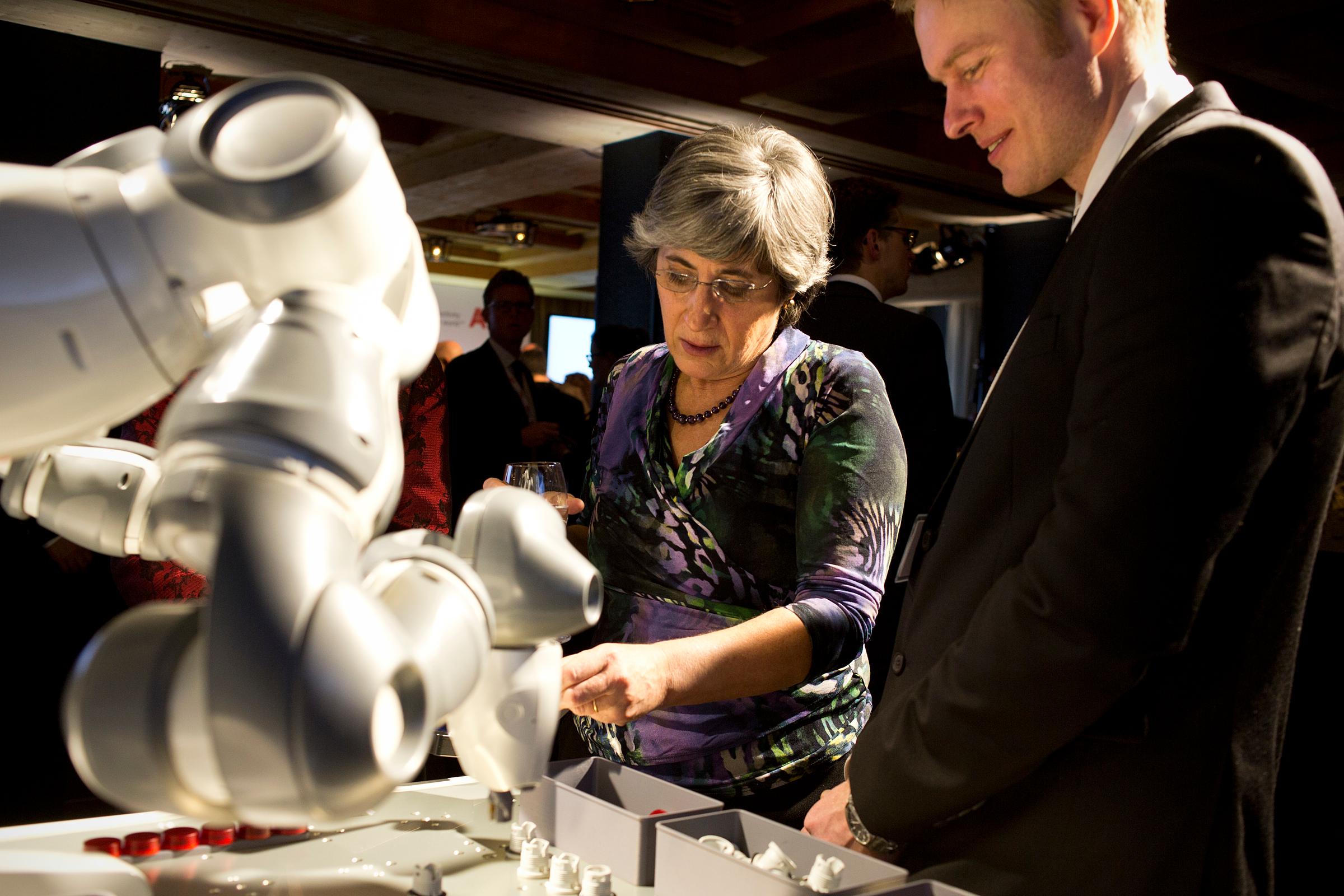
Smart robots divide opinion in Davos

Artificially intelligent robots are only in their infancy, but Davos is already blaming them for the future destruction of jobs, the middle class and even the human race. However, some people at the annual meeting of the World Economic Forum (WEF) think robots are getting an unfair hearing.
A world full of intelligent machines with the same cognitive capacity as humans which can think creatively and make moral judgements on the battlefield is a worrying thought for many people. But a world with robots which look after the sick, teach children, clean up the house and construct energy-saving devices might be a more appetising scenario for others.
Smart systems already exist that can outperform, or even out-think, humans – such as chess programmes or GPS devices that can find uncongested routes from one point to another.
One panel discussion in Davos this week heard about an artificial intelligence (AI) system that can master numerous complex video games hours after being switched on for the first time.
“If you had a newborn baby that by the afternoon started playing computer games at a superhuman level, you might be a bit concerned,” said Stuart Russell, professor of computer science at the University of California. “It’s just common sense that having things that are smarter than you could pose a risk.”
But this argument was dismissed by Manuela Veloso, a professor of computer science at Carnegie Mellon University in the United States.
“Are we in the business of mistrusting smarter people?” the AI expert asked swissinfo.ch. “I wish there were robots that were smarter than me at investing my money or changing my utility provider. I wish there were robots that could make better decisions than I do. There are so many benefits to having machines that can reason better than our limited ways.”

Veloso has a problem with some of the scare stories being generated both in Davos and in the wider world.
Scare stories
“If we scare our children so much that they are eventually so afraid of robotics, they will not contribute to the advancement of technology,” she said.
“It’s great that we are aware of the dangers so we can advance our research well, but we should not stop doing it. There is still a long way to go.”
The key is to place safety limitations on machines so they only operate for the good of humanity. One technique developed at Carnegie Mellon is to programme clear boundaries into machines that stop and ask for human help when the boundaries have been reached.

More
Coming soon to a battlefield near you?
One area where smart machines are already making an impact is in the workplace. Swiss-Swedish engineering firm ABB presented what it billed as the “world’s first truly collaborative robot”, YuMi, on the sidelines of WEF. The robot is equipped with two arms and sensors that allow it to interact safely with humans – breaking a boundary in the factory.
It is time to take robots out of orange cages and move them around the production line to cooperate in tasks with people, ABB chief executive Ulrich Spiesshofer told delegates.
That raises the question of job security for the people who used to carry out these tasks. On the eve of the Davos forum, WEF produced a report calculating that a net five million jobs would be replaced by robots and smart software by 2020 – mainly administrative and managerial positions, but also less obvious areas like accounting and health professionals.
Unlocking the door
This is a prospect that alarms the trade union movement.
“Some serious questions have to be asked when, in our time, we will see a civilisation with machines that have the same cognitive and creative capacity and free will as humans. We will be going beyond a limit that people find tolerable. This is a new development that requires new regulations,” Philip Jennings, General Secretary of the UNI Global Union, told swissinfo.ch.
However, there are many observers who believe that new technology can produce net job growth in future – provided educational, apprenticeship and work training schemes are brought up to scratch.
Manuela Veloso is convinced that people are perfectly capable of plotting the right path through all the current uncertainties.
“Buddhists say humankind has been given the key to open heaven, but the same key also opens hell. And the key doesn’t come with instructions on how to open one or the other,” she told swissinfo.ch.
“Technology is that key. We can make good uses or bad uses, that’s our choice. It’s in our control. We have the key so we can’t reverse and go back to a world without computers. We have the key but we are far from knowing how to use it or the whole range of uses it has.”
War robots
Another panel discussion in Davos this week focused on the use of machines and AI by the military. On Thursday, the panel debated the theme, “What If: Robots Go To War?”
Stuart Russell, who is also a member of the International Committee for Robot Arms Control (ICRAC), said it was theoretically possible to introduce killing machines to the battlefield in a few years if the will is there. He gave an example of quadcopters that could be fitted with weapons and sensors to selectively target and eliminate certain individuals or whole groups of people autonomously.
The debate heard that regulations and the rules of warfare have been left behind by the rapid acceleration of AI technology with military applications. This is not the first time the issue has been raised in Switzerland, the depositary country of the Geneva Conventions on warfare.
Several meetings have taken place in Geneva, such as the one covered by swissinfo.ch in the summer of 2014.
At the WEF Davos debate on Thursday, Sir Roger Carr, chairman of BAE systems which manufactures military hardware, acknowledged that there was a growing concern about separating machines from humans and giving machines the decision on when to fire. He called on governments to draw the line at moving into the “territory where we risk becoming the architects of destruction, but simply observers of the event”.

In compliance with the JTI standards
More: SWI swissinfo.ch certified by the Journalism Trust Initiative































You can find an overview of ongoing debates with our journalists here . Please join us!
If you want to start a conversation about a topic raised in this article or want to report factual errors, email us at english@swissinfo.ch.